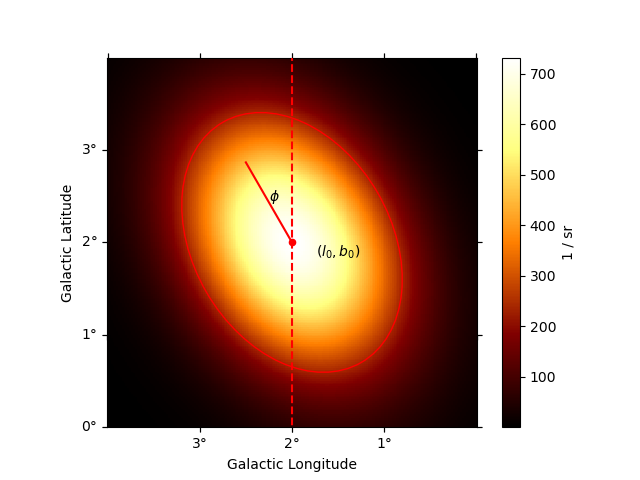Note
Click here to download the full example code
Gaussian spatial model¶
This is a spatial model parametrising a Gaussian function.
By default, the Gaussian is symmetric:
where \(\theta\) is the sky separation to the model center. In this case, the Gaussian is normalized to 1 on the sphere:
In the limit of small \(\theta\) and \(\sigma\), this definition reduces to the usual form:
In case an eccentricity (\(e\)) and rotation angle (\(\phi\)) are passed, then the model is an elongated Gaussian, whose evaluation is performed as in the symmetric case but using the effective radius of the Gaussian:
Here, \(\sigma_M\) (\(\sigma_m\)) is the major (minor) semiaxis of the Gaussian, and
\(\Delta \phi\) is the difference between phi, the position angle of the Gaussian, and the
position angle of the evaluation point.
Caveat: For the asymmetric Gaussian, the model is normalized to 1 on the plane, i.e. in small angle approximation: \(N = 1/(2 \pi \sigma_M \sigma_m)\). This means that for huge elongated Gaussians on the sky this model is not correctly normalized. However, this approximation is perfectly acceptable for the more common case of models with modest dimensions: indeed, the error introduced by normalizing on the plane rather than on the sphere is below 0.1% for Gaussians with radii smaller than ~ 5 deg.
Example plot¶
Here is an example plot of the model:
import numpy as np
from astropy.coordinates import Angle
from gammapy.maps import WcsGeom
from gammapy.modeling.models import (
GaussianSpatialModel,
Models,
PowerLawSpectralModel,
SkyModel,
)
phi = Angle("30 deg")
model = GaussianSpatialModel(
lon_0="2 deg",
lat_0="2 deg",
sigma="1 deg",
e=0.7,
phi=phi,
frame="galactic",
)
geom = WcsGeom.create(
skydir=model.position, frame=model.frame, width=(4, 4), binsz=0.02
)
ax = model.plot(geom=geom, add_cbar=True)
# illustrate size parameter
region = model.to_region().to_pixel(ax.wcs)
artist = region.as_artist(facecolor="none", edgecolor="red")
ax.add_artist(artist)
transform = ax.get_transform("galactic")
ax.scatter(2, 2, transform=transform, s=20, edgecolor="red", facecolor="red")
ax.text(1.5, 1.85, r"$(l_0, b_0)$", transform=transform, ha="center")
ax.plot([2, 2 + np.sin(phi)], [2, 2 + np.cos(phi)], color="r", transform=transform)
ax.vlines(x=2, color="r", linestyle="--", transform=transform, ymin=-5, ymax=5)
ax.text(2.25, 2.45, r"$\phi$", transform=transform)

YAML representation¶
Here is an example YAML file using the model:
pwl = PowerLawSpectralModel()
gauss = GaussianSpatialModel()
model = SkyModel(spectral_model=pwl, spatial_model=gauss, name="pwl-gauss-model")
models = Models([model])
print(models.to_yaml())
Out:
components:
- name: pwl-gauss-model
type: SkyModel
spectral:
type: PowerLawSpectralModel
parameters:
- name: index
value: 2.0
- name: amplitude
value: 1.0e-12
unit: cm-2 s-1 TeV-1
- name: reference
value: 1.0
unit: TeV
frozen: true
spatial:
type: GaussianSpatialModel
frame: icrs
parameters:
- name: lon_0
value: 0.0
unit: deg
- name: lat_0
value: 0.0
unit: deg
- name: sigma
value: 1.0
unit: deg
- name: e
value: 0.0
frozen: true
- name: phi
value: 0.0
unit: deg
frozen: true